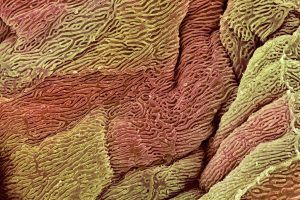Carl Zimmer in The New York Times:
 Cancer is a disease of mutations. Tumor cells are riddled with genetic mutations not found in healthy cells. Scientists estimate that it takes five to 10 key mutations for a healthy cell to become cancerous. Some of these mutations can be caused by assaults from the environment, such as ultraviolet rays and cigarette smoke. Others arise from harmful molecules produced by the cells themselves. In recent years, researchers have begun taking a closer look at these mutations, to try to understand how they arise in healthy cells, and what causes these cells to later erupt into full-blown cancer. The research has produced some major surprises. For instance, it turns out that a large portion of the cells in healthy people carry far more mutations than expected, including some mutations thought to be the prime drivers of cancer. These mutations make a cell grow faster than others, raising the question of why full-blown cancer isn’t far more common. “This is quite a fundamental piece of biology that we were unaware of,” said Inigo Martincorena, a geneticist at the Wellcome Sanger Institute in Cambridge, England.These lurking mutations went unnoticed for so long because the tools for examining DNA were too crude. If scientists wanted to sequence the entire genome of tumor cells, they had to gather millions of cells and analyze all of the DNA. A mutation, to be detectable, had to be very common.
Cancer is a disease of mutations. Tumor cells are riddled with genetic mutations not found in healthy cells. Scientists estimate that it takes five to 10 key mutations for a healthy cell to become cancerous. Some of these mutations can be caused by assaults from the environment, such as ultraviolet rays and cigarette smoke. Others arise from harmful molecules produced by the cells themselves. In recent years, researchers have begun taking a closer look at these mutations, to try to understand how they arise in healthy cells, and what causes these cells to later erupt into full-blown cancer. The research has produced some major surprises. For instance, it turns out that a large portion of the cells in healthy people carry far more mutations than expected, including some mutations thought to be the prime drivers of cancer. These mutations make a cell grow faster than others, raising the question of why full-blown cancer isn’t far more common. “This is quite a fundamental piece of biology that we were unaware of,” said Inigo Martincorena, a geneticist at the Wellcome Sanger Institute in Cambridge, England.These lurking mutations went unnoticed for so long because the tools for examining DNA were too crude. If scientists wanted to sequence the entire genome of tumor cells, they had to gather millions of cells and analyze all of the DNA. A mutation, to be detectable, had to be very common.
But as DNA sequencing grew more sophisticated, Dr. Martincorena and other researchers developed methods for detecting very rare mutations, and they began to wonder if those mutations might be found in healthy cells, hidden below the radar. Dr. Martincorena and his colleagues began their search in skin; its cells are battered daily by the sun’s ultraviolet rays, which trigger mutations. “We thought it was the lowest-hanging fruit,” Dr. Martincorena said. In a study in 2015, he and his colleagues collected bits of skin left over from cosmetic surgeries to lift drooping eyelids. They examined 234 biopsies from four patients, each sample of skin about the size of a pinhead. They gently coaxed the top layers of cells, known as epithelial cells, from the underlying tissue. Dr. Martincorena’s team then fished the DNA from the healthy epithelial cells, and carefully sequenced 74 genes that are known to play an important role in the development of cancer. Mutations that are common in cancer genes were remarkably common in these healthy skin cells, too, the researchers found. About one of every four epithelial cells carried a mutation on a cancer-linked gene, speeding up the cell’s growth.
More here.
